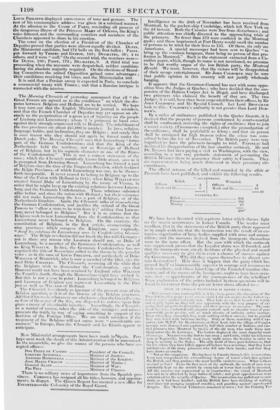The Morning Chronicle of yesterday announced that all " the
Great Powers are agreed as to the conditions" on which the dis- putes between Belgium and Holland are to be settled. We hope at may turn out that the English Ministerial journal is mistaken, and that the French Chamber of Deputies may yet oppose an ob- stacle to the perpetration of a gross act of injustice on the people of Limburg and Luxemburg, ; whom it is proposed to hand over. against their strongly-expressed will, to Holland. The inhabitants of the two provinces arc about 24:),000 in number. In laws, religion, language, habits, and inclination, they are Belgian : and surely that is .sonte reason why they should not again be forced under the Dutch yoke. The Morning Chronicle says that Luxemburg forms part of the German Confederation ; and that the King of the Fetherlands held the territory, not as Sovereign of Holland or of Belgium, but in his separate character as one of the States of the Confederation." This is not a correct statement of the case ; which the Chronicle manifbstly knows little about, save as it is prompted from Downing Street. Luxemburg ha; tItruted a part of Belgium since the time of the Pragmatic Sanction, which declared the Belgic Provinces, of which Luxemburg, was one, to be thence- forth inseparable. It never ceased to belong to Belgium up to the time of the Union with Holland in 1815 ; when King Wn.t.t.tm was created Grand Duke of Luxemburg by the treaty of Vienna, in order that he might keep up the existing relations between Luxem- burg and the Germanic Confederation. Those relations subsisted alike betbre and since the union with Holland ; but their existence did not make Luxemburg the less a part of Belgium, or of the Netherlands kingdom. Again, the Chronicle talks of dismembering the German Confederation, and justifies the refusal of the Great
Powers to "allow a state to be torn from it ;" adding that Luxem- burg never belonged to Belgium." But it is as untrue that the Belgians seek to tear Luxemburg front the Confederation, as that Luxemburg never belonged to Belgium. On the contrary, the
constitution of Belgium, in the first article, enumerating the nine provinces which compose the Kingdom, says expressly, " San/ les relations du Luxembourg aree let Confederation r- ftigiu The Belgic revolution did not break the tics with Germany : nor is there any reason why LEoPosn should not, as Duke of Luxemburg, be a member of the Germanic Confederation, as well as King Wissism. In fact, the Germanic Confederation has re- cognized the title of Sovereigns called to the throne be the popular voice ; as in the case of Louts PHILIPPE, and particularly of Duke Wistssst of Brunswick, who is now a member of the Diet, vice the mad Duke CHARLES. The (Aso/tide, assuming, all the while that the Belgians wish to dismember the Confederation, says that Hanover could not have been retained by England after Wissiam the Fourth's death, though the Ilanoverians might have wished it. But this is not a ease in point : Luxemburg belonged to Belgium. and Luoporn of Belgium can represent Luxemburg in the Diet just as well as WILLIAM Of Holland. The Chrorrieb- is evidently as ignorant of the present state of the Belgian question, as it is of the history of the Belgian provinces. All t hat it knows is, w hat every one else knows, that the Great Po\,ers, or f atr of them out of the live, are disposed to eittlaw upon Bel- gium a treaty of abominable injustice. Accordingly, the C'hilthirte, as a matter of course, takes the side of the stronger ; and misre- presents the truth, by way of saying something in support of the decision of the Foreign Office. We are much mistaken if' the treatment of the Belgians will not cause more " considerabk un- easiness" in Europe, than the Chronicle and its friends appear to anticipate.


























 Previous page
Previous page